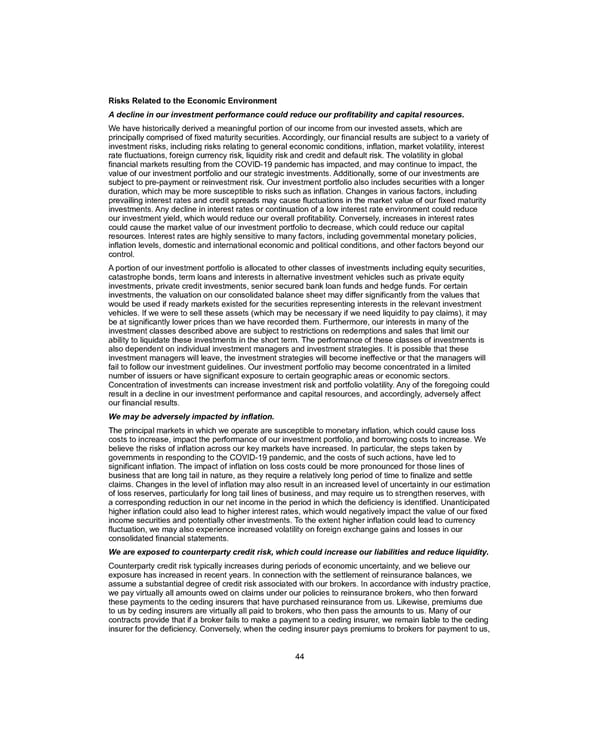Risks Related to the Economic Environment A decline in our investment performance could reduce our profitability and capital resources. We have historically derived a meaningful portion of our income from our invested assets, which are principally comprised of fixed maturity securities. Accordingly, our financial results are subject to a variety of investment risks, including risks relating to general economic conditions, inflation, market volatility, interest rate fluctuations, foreign currency risk, liquidity risk and credit and default risk. The volatility in global financial markets resulting from the COVID-19 pandemic has impacted, and may continue to impact, the value of our investment portfolio and our strategic investments. Additionally, some of our investments are subject to pre-payment or reinvestment risk. Our investment portfolio also includes securities with a longer duration, which may be more susceptible to risks such as inflation. Changes in various factors, including prevailing interest rates and credit spreads may cause fluctuations in the market value of our fixed maturity investments. Any decline in interest rates or continuation of a low interest rate environment could reduce our investment yield, which would reduce our overall profitability. Conversely, increases in interest rates could cause the market value of our investment portfolio to decrease, which could reduce our capital resources. Interest rates are highly sensitive to many factors, including governmental monetary policies, inflation levels, domestic and international economic and political conditions, and other factors beyond our control. A portion of our investment portfolio is allocated to other classes of investments including equity securities, catastrophe bonds, term loans and interests in alternative investment vehicles such as private equity investments, private credit investments, senior secured bank loan funds and hedge funds. For certain investments, the valuation on our consolidated balance sheet may differ significantly from the values that would be used if ready markets existed for the securities representing interests in the relevant investment vehicles. If we were to sell these assets (which may be necessary if we need liquidity to pay claims), it may be at significantly lower prices than we have recorded them. Furthermore, our interests in many of the investment classes described above are subject to restrictions on redemptions and sales that limit our ability to liquidate these investments in the short term. The performance of these classes of investments is also dependent on individual investment managers and investment strategies. It is possible that these investment managers will leave, the investment strategies will become ineffective or that the managers will fail to follow our investment guidelines. Our investment portfolio may become concentrated in a limited number of issuers or have significant exposure to certain geographic areas or economic sectors. Concentration of investments can increase investment risk and portfolio volatility. Any of the foregoing could result in a decline in our investment performance and capital resources, and accordingly, adversely affect our financial results. We may be adversely impacted by inflation. The principal markets in which we operate are susceptible to monetary inflation, which could cause loss costs to increase, impact the performance of our investment portfolio, and borrowing costs to increase. We believe the risks of inflation across our key markets have increased. In particular, the steps taken by governments in responding to the COVID-19 pandemic, and the costs of such actions, have led to significant inflation. The impact of inflation on loss costs could be more pronounced for those lines of business that are long tail in nature, as they require a relatively long period of time to finalize and settle claims. Changes in the level of inflation may also result in an increased level of uncertainty in our estimation of loss reserves, particularly for long tail lines of business, and may require us to strengthen reserves, with a corresponding reduction in our net income in the period in which the deficiency is identified. Unanticipated higher inflation could also lead to higher interest rates, which would negatively impact the value of our fixed income securities and potentially other investments. To the extent higher inflation could lead to currency fluctuation, we may also experience increased volatility on foreign exchange gains and losses in our consolidated financial statements. We are exposed to counterparty credit risk, which could increase our liabilities and reduce liquidity. Counterparty credit risk typically increases during periods of economic uncertainty, and we believe our exposure has increased in recent years. In connection with the settlement of reinsurance balances, we assume a substantial degree of credit risk associated with our brokers. In accordance with industry practice, we pay virtually all amounts owed on claims under our policies to reinsurance brokers, who then forward these payments to the ceding insurers that have purchased reinsurance from us. Likewise, premiums due to us by ceding insurers are virtually all paid to brokers, who then pass the amounts to us. Many of our contracts provide that if a broker fails to make a payment to a ceding insurer, we remain liable to the ceding insurer for the deficiency. Conversely, when the ceding insurer pays premiums to brokers for payment to us, 44
 2021 Annual Report Page 59 Page 61
2021 Annual Report Page 59 Page 61